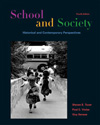 |  School and Society: Historical and Contemporary Perspectives, 4/e Stephen E. Tozer,
The University of Illinois, Chicago
Paul C. Violas
Guy Senese,
Northern Arizona University
Diversity and Equity: Schooling and African Americans
Professional Vocabulary- Black Codes
- After Reconstruction, local laws passed throughout the South that restricted African-Americans' civil and political rights.
- The Crisis
- A journal founded and edited by W. E. B. Du Bois shortly after the founding of the NAACP in 1910; dedicated to educating people about racial discrimination; reached a peak circulation of 100,000 in 1918.
- Du Bois, W. E. B. (1868-1963)
- A scholar and political theorist activist; author of Souls of Black Folk and numerous other books; founded and edited the Crisis, an early NAACP publication.
- Fifteenth Amendment to the U.S. Constitution
- Adopted on March 30, 1870; reads in part, "The right of citizens of the United States to vote shall not be denied or abridged by the United States or by any State on account of race, color, or previous condition of servitude."
- Fourteenth Amendment to the U.S. Constitution
- Adopted on July 28, 1868; reads in part, "All persons born or naturalized in the United States, and subject to the jurisdiction thereof, are citizens of the United States and of the State wherein they reside . . . nor shall any State deprive any person of life, liberty or property, without due process of law; nor deny any person within its jurisdiction the equal protection of such laws."
- Freedman's Bureau
- Formed by Congress in 1867 under the first Reconstruction act; a U.S. government agency designed to help ex-slaves exercise new economic, civil, and political rights and freedoms in the post-Civil War United States.
- historically black colleges
- Colleges (some of which have become universities) that were founded for the higher education of African-Americans after the Civil War.
- Mississippi Plan
- A system of codes and laws instituted by the state of Mississippi to deprive African-Americans of their civil and political rights after Reconstruction; the eventual basis for Jim Crow laws throughout the South until the 1954 Supreme Court Decision Brown v. Board of Education.
- NAACP
- The National Association for the Advancement of Colored People; an advocacy group formed in 1910 to fight for the legal, civil, and political rights of African-Americans.
- Reconstruction
- The period mandated by Congress after the Civil War in which the political, social, and economic structure of the South would be rebuilt without slavery; lasted from 1865 to 1877.
- redemption
- The period after Reconstruction when the South would be "redeemed" from the federal interference with state autonomy and white rule.
- Thirteenth Amendment to the U.S. Constitution
- Adopted on December 18, 1865; reads in part, "Neither slavery nor involuntary servitude, except as a punishment for crime whereof the party shall have been duly convicted, shall exist within the United States, or any place subject to their jurisdiction."
- Tuskegee Institute
- Founded by Booker T. Washington in 1881; an institution for the vocational training of African-American youth that later became a major university and is now counted prominently among the nation's historically black colleges and universities.
- Washington, Booker T. (1856-1915)
- Founder of the Tuskegee Institute and a high-profile leader of African-Americans at the end of the 19th century and the first 15 years of the 20th; the author of Up from Slavery.
|
|



 2002 McGraw-Hill Higher Education
2002 McGraw-Hill Higher Education